| Listing 1 - 10 of 22 | << page >> |
Sort by
|
Book

ISBN: 0820350966 9780820350967 9780820350974 0820350974 0820356832 Year: 2017 Publisher: Athens
Abstract | Keywords | Export | Availability | Bookmark
 Loading...
Loading...Choose an application
- Reference Manager
- EndNote
- RefWorks (Direct export to RefWorks)
Book
ISBN: 081427076X 0814211569 Year: 2011 Publisher: Columbus : Ohio State University Press,
Abstract | Keywords | Export | Availability | Bookmark
 Loading...
Loading...Choose an application
- Reference Manager
- EndNote
- RefWorks (Direct export to RefWorks)
African American men in literature. --- Masculinity --- Masculinity in literature. --- History --- Masculinity (Psychology) in literature --- Masculinity (Psychology) --- Sex (Psychology) --- Men --- Afro-American men in literature
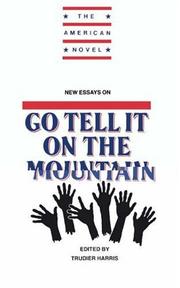
ISBN: 0521495040 0521498260 1139166786 9781139166782 9780521495042 9780521498265 Year: 1996 Publisher: Cambridge Cambridge University Press
Abstract | Keywords | Export | Availability | Bookmark
 Loading...
Loading...Choose an application
- Reference Manager
- EndNote
- RefWorks (Direct export to RefWorks)
James Baldwin's first novel, Go Tell It on the Mountain, has gained a wide readership and much critical acclaim since its publication in 1953. While most critics have seen it as focusing exclusively on the African American fundamentalist church and its effect on characters brought up within its tradition, these scholars posit that issues of homosexuality, the social construction of identity, anthropological conceptions of community, and the quest for an artistic identity provide more elucidating approaches to the novel. Trudier Harris's introduction traces the history of its composition and the critical responses after its eventual publication; Michael F. Lynch re-evaluates the religious centre of the novel; Bryan R. Washington argues that the text has much to do with the uncovering of sexual identity; Vivian M. May uncovers the shifting identities throughout the work; and Keith Clark explores the quest of the characters for male communitas.
Baldwin, James --- Arts and Humanities --- Literature --- African American churches in literature. --- African American men in literature. --- African American churches in literature --- African American men in literature --- English --- Languages & Literatures --- American Literature --- Afro-American men in literature --- Baldwin, James,
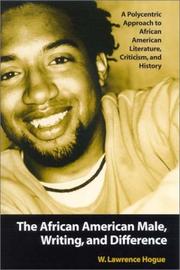
ISBN: 0791487008 1417524111 9781417524112 0791456935 9780791456934 0791456943 9780791456941 9780791487006 Year: 2003 Publisher: Albany State University of New York Press
Abstract | Keywords | Export | Availability | Bookmark
 Loading...
Loading...Choose an application
- Reference Manager
- EndNote
- RefWorks (Direct export to RefWorks)
Argues that African American literature must take into account the rich diversity of African American life and culture.
African American men in literature. --- Difference (Psychology) in literature. --- African American men --- American literature --- Afro-American men in literature --- English literature --- Agrarians (Group of writers) --- Intellectual life. --- Male authors --- History and criticism. --- African American authors
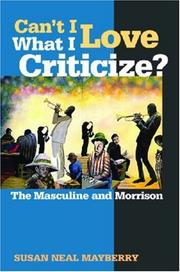
ISBN: 1282726145 9786612726149 0820336513 9780820336510 9780820329451 0820329452 Year: 2007 Publisher: Athens ; London : The University of Georgia Press,
Abstract | Keywords | Export | Availability | Bookmark
 Loading...
Loading...Choose an application
- Reference Manager
- EndNote
- RefWorks (Direct export to RefWorks)
Taking a close look at all the key male figures in Toni Morrison’s eight novels, this book explores Morrison’s admitted, but critically neglected, interest in the relationships between African American men and women and the “axes” on which these relationships turn. Most Morrison scholarship deals with her female characters. Can’t I Love What I Criticize? offers a response to this imbalance and to Morrison’s call for more work on men, who remain, in her words, “outside of that little community value thing.”The book also considers the barriers between black men and women thrown up by their participation in a larger, historically racist culture of competition, ownership, sexual repression, and fixed ideals about physical beauty and romantic love. Black women, Morrison says, bear their crosses “extremely well,” and black men, although they have been routinely emasculated by “white men, period,” have managed to maintain a feisty “magic” that everybody wants but nobody else has.Understanding Morrison’s treatment of her male characters, says Susan Mayberry, becomes crucial to grasping her success in “countering the damage done by a spectrum of sometimes misguided isms”--including white American feminism. Morrison’s version of masculinity suggests that black men have “successfully retained their special vitality in spite of white male resistance” and that “their connections to black women have saved their lives.” To single out her men is not to negate the preeminence of her women; rather, it is to recognize the interconnectedness and balance between them.
Masculinity in literature. --- African American men in literature. --- Masculinity (Psychology) in literature --- Afro-American men in literature --- Morrison, Toni --- Criticism and interpretation. --- Wofford, Chloe Anthony --- Morrisonová, Toni --- מוריסון, טוני --- Masculinity in literature --- Morrison, Toni.
Book
ISBN: 0814786545 0814741355 9780814741351 9780814740941 0814740944 9780814740958 0814740952 9780814786543 Year: 2010 Publisher: New York New York University Press
Abstract | Keywords | Export | Availability | Bookmark
 Loading...
Loading...Choose an application
- Reference Manager
- EndNote
- RefWorks (Direct export to RefWorks)
Challenging the conception of empowerment associated with the Black Power Movement and its political and intellectual legacies in the present, Darieck Scott contends that power can be found not only in martial resistance, but, surprisingly, where the black body has been inflicted with harm or humiliation.Theorizing the relation between blackness and abjection by foregrounding often neglected depictions of the sexual exploitation and humiliation of men in works by James Weldon Johnson, Toni Morrison, Amiri Baraka, and Samuel R. Delany, Extravagant Abjection asks: If we’re racialized through domination and abjection, what is the political, personal, and psychological potential in racialization-through-abjection? Using the figure of male rape as a lens through which to examine this question, Scott argues that blackness in relation to abjection endows its inheritors with a form of counter-intuitive power—indeed, what can be thought of as a revised notion of black power. This power is found at the point at which ego, identity, body, race, and nation seem to reveal themselves as utterly penetrated and compromised, without defensible boundary. Yet in Extravagant Abjection, “power” assumes an unexpected and paradoxical form.In arguing that blackness endows its inheritors with a surprising form of counter–intuitive power—as a resource for the political present—found at the very point of violation, Extravagant Abjection enriches our understanding of the construction of black male identity.
Abjection in literature. --- Pornography in literature. --- Homosexuality in literature. --- Rape in literature. --- Race relations in literature. --- Power (Social sciences) in literature. --- African American men in literature. --- American fiction --- Afro-American men in literature --- African American authors --- History and criticism.
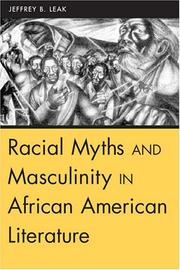
ISBN: 157233357X 9781572333574 Year: 2005 Publisher: Knoxville : The University of Tennessee Press,
Abstract | Keywords | Export | Availability | Bookmark
 Loading...
Loading...Choose an application
- Reference Manager
- EndNote
- RefWorks (Direct export to RefWorks)
The portrayal of black men in our national literature is controversial, complex, and often contradictory. In Racial Myths and Masculinity in African American Literature, Jeffrey B. Leak identifies some of the long-held myths and stereotypes that persist in the work of black writers from the nineteenth century to the present?intellectual inferiority, criminality, sexual prowess, homosexual emasculation, and cultural deprivation. Utilizing Robert B. Stepto's call-and-response theory, Leak studies four pairs of novels within the context of certain myths, identifying the literary tandems between them and seeking to discover the source of our culture?s psychological preoccupation with black men.Calling upon interdisciplinary fields of study?literary theory, psychoanalysis, gender studies, legal theory, and queer theory?Leak offers groundbreaking analysis of both canonical texts (representing the "call" of the call-and-response dyad) and texts by emerging writers (representing the ?response?), including Frederick Douglass and Charles Johnson; Ralph Ellison and Brent Wade; Richard Wright and Ernest J. Gaines; and Toni Morrison and David Bradley. Though Leak does not claim that the ?response? texts are superior to the "call" texts, he does argue that, in some cases, the newer work-such as Charles Johnson's Oxherding Tale-can address a theme or offer a narrative innovation not found in preceding texts, such as Narrative of the Life of Frederick Douglass. In these instances, argues Leak, the newer texts constitute not only a response to the call text, but a substantial revision. Leak offers the first in-depth criticism of black masculinity in a range of literary texts. In a final chapter, he expands his discussion to the emerging field of black masculinity studies, pointing to future directions for study, including memoir, film, drama, and others. Poised on the brink of exciting new trends in scholarship, Racial Myths and Masculinity in African American Literature is a flagship work, enhancing the understanding of literary constructions of black masculinity and the larger cultural imperatives to which these writers are reacting.
American fiction --- African Americans --- African American men in literature --- Masculinity in literature --- Race in literature --- Myth in literature --- Men in literature --- African American authors --- History and criticism --- Intellectual life --- Masculinity (Psychology) in literature --- American literature --- African American intellectuals --- Afro-American men in literature --- African American authors&delete&
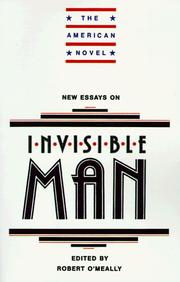
ISBN: 0521313694 0521308968 0511620470 9780521313698 9780511620478 9780521308960 Year: 1988 Publisher: Cambridge: Cambridge university press,
Abstract | Keywords | Export | Availability | Bookmark
 Loading...
Loading...Choose an application
- Reference Manager
- EndNote
- RefWorks (Direct export to RefWorks)
Published less than fifty years ago, Ralph Ellison's Invisible Man shares with older classic works the odd quality of seeming to have been in place much longer. It is a novel that encompasses much of the American scene and character: though told by a single Afro-American voice and set in the contemporary South and then in modern New York City, its references are to the First World War, to Reconstruction, to the Civil War and slavery, to the founding of the American republic, to Columbus, and to the country's frontier past. In his introduction to this volume Robert O'Meally discusses Ellison's fictional strategies for reaching a wide audience while remaining true to his own artistic vision and voice. Then each of five critical essays explores a different aspect of this capacious novel. One looks at the novel's protagonist as an embattled artist-in-training: another focuses on the novel's political and philosophical backgrounds; a third discusses the style and meaning of the nameless narrator's speeches; a fourth examines the novel's modernism in light of its references to jazz and anthropology: and the final essay considers Invisible Man as a kind of war novel. Written in an accessible style, these essays represent the best of recent scholarship and provide students with a useful introduction to this major novel.
Ellison, Ralph --- Ellison, Ralph. --- African American men in literature. --- African Americans in literature. --- African American men in literature --- African Americans in literature --- Afro-Americans in literature --- Negroes in literature --- Afro-American men in literature --- Ellison, Ralph Waldo --- Arts and Humanities --- Literature --- English --- Languages & Literatures --- American Literature --- Ellison (ralph), 1913 --- -African American men in literature. --- -Ellison (ralph), 1913 --- -Ellison, Ralph
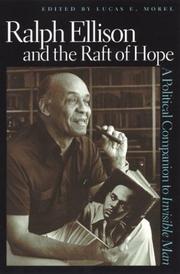
ISBN: 0813147735 9780813147734 0813123127 9780813123127 1322595542 0813182646 0813191629 Year: 2004 Publisher: Lexington University Press of Kentucky
Abstract | Keywords | Export | Availability | Bookmark
 Loading...
Loading...Choose an application
- Reference Manager
- EndNote
- RefWorks (Direct export to RefWorks)
An important new collection of original essays that examine how Ellison's landmark novel, Invisible Man (1952), addresses the social, cultural, political, economic, and racial contradictions of America. Commenting on the significance of Mark Twain's writings, Ralph Ellison wrote that ""a novel could be fashioned as a raft of hope, perception and entertainment that might help keep us afloat as we tried to negotiate the snags and whirlpools that mark our nation's vacillating course toward and away from the democratic ideal."" Ellison believed it was the contradiction between America's ""noble id
African Americans in literature. --- African American men in literature. --- Political fiction, American --- Politics and literature --- Afro-Americans in literature --- Negroes in literature --- Afro-American men in literature --- History and criticism. --- History --- Ellison, Ralph --- Ellison, Ralph. --- אליסון, ראלף --- Political and social views.
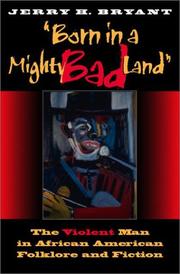
ISBN: 1282072137 0253101220 0253109892 9786612072130 9780253109897 9780253101228 9781282072138 661207213X 0253342066 0253215781 9780253342065 9780253215789 Year: 2003 Publisher: Bloomington Indiana University Press
Abstract | Keywords | Export | Availability | Bookmark
 Loading...
Loading...Choose an application
- Reference Manager
- EndNote
- RefWorks (Direct export to RefWorks)
The figure of the violent man in the African American imagination has a long history. He can be found in 19th-century bad man ballads like 'Stagolee' and 'John Hardy,' as well as in the black convict recitations that influenced 'gansta' rap. Born in a Mighty Bad Land connects this figure with similar characters in African American fiction.
Men --- Men in literature. --- Violence --- African Americans --- African American men in literature. --- Literature and folklore --- Violence in literature. --- American fiction --- Human males --- Human beings --- Males --- Effeminacy --- Masculinity --- Violence (in religion, folklore, etc.) --- Afro-American men in literature --- Folklore and literature --- Literature and folk-lore --- Folklore --- African American intellectuals --- Folklore. --- Intellectual life. --- African American authors --- History and criticism.
| Listing 1 - 10 of 22 | << page >> |
Sort by
|

 Search
Search Feedback
Feedback About UniCat
About UniCat  Help
Help News
News